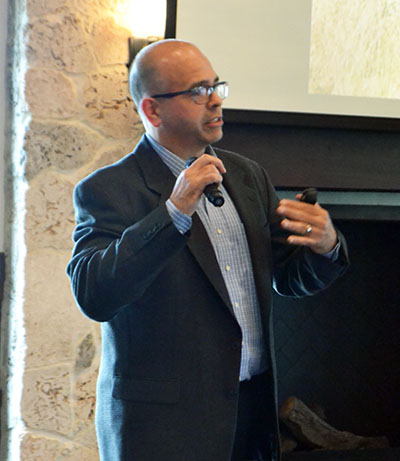By Eve Rosen
On Wednesday, May 23, the Wellington Chamber of Commerce hosted a luncheon at the International Polo Club Palm Beach that featured guest speaker Assistant Village Manager Jim Barnes on the theme of “Community Reinvestment and Redevelopment.”
Chamber President Roxanne Stein began the luncheon by welcoming the newcomers to the chamber and had them introduce themselves. She then introduced Barnes for his presentation.
Barnes has been Wellington’s assistant village manager since November 2015. He previously served as assistant director of the Community Services Department, deputy director of Environmental & Engineering Services, director of the Parks & Recreation Department and other roles. With a bachelor’s degree in geography, Barnes is certified by the American Institute of Certified Planners.
Barnes discussed what Wellington was like during the economic downturn that began in 2008 and how far the community has come since then. He compared the Village of Wellington to those who have graduated during the past two weeks.
“We need to remember where we came from, and then we can figure out where we are going to go,” he explained. “Again, and the whole spirit of we are graduating, we are students, we are learning, which is a lifelong learning process.”
Barnes broke up the growth of Wellington into sections, the first being 1996 to 2008, which is when the recession hit.
“In the time frame from 1996 to 2008, we had more growth and more development,” he said. “Just to get an idea, when we incorporated, there were about 22,000 people in Wellington. Today we have more than 60,000.”
The ideas of what to do with the equestrian industry and commercial areas of Wellington in 2008 prompted village leaders to contemplate what they envision for the future of Wellington, and it led to the village’s goals of reinvestment. This resulted in the Wellington Town Center, adding the Wellington Amphitheater, Scott’s Place playground and more to an area of centrally located, village-owned land.
Barnes discussed the quality of the staff that is working on these reinvestment concepts. The village’s purchasing staff and the public works staff are nationally accredited by national sources, he noted.
“So, the cliché it takes a village, really it takes support from the residents and their community, it takes staff doing the best they can for the village, and it also takes the vision and policy setting we get from the Wellington Village Council,” Barnes said.
In order to improve the community after the 2008 downturn, the town center was formed in order to gain more public investment.
Barnes showed several maps and plans that would involve the gathering of more people into the community and to get them more engaged. He discussed adding to the town center, such as a café and some things on the water. He cited statistics of the population of Wellington in order to get more ideas on how to get the community more involved with the changing demographics.
“Seventy percent of households in Wellington are single family, therefore they are family households, which proves that Wellington is a family community,” Barnes said. “Something to note though is that in the last years, 2010 to now, seniors 55 and over increased in population 31 percent; 65 and over increased 52 percent.”
Barnes compared the employment growth of Wellington to that of the country, using statistics he gathered.
“Interestingly, we have a business community and employment, alone, has increased about 21 percent since 2010. The United States number is 15 percent, so we are outperforming the country. The salary average in Wellington is highest in the State of Florida,” Barnes said.
According to the preliminary studies described by Barnes, the number of new businesses has increased by 20 percent. The economy is changing, as well as what people want. More people want to be in more “hipster” areas, such as downtown locations.
The village is looking into changing or improving some of the buildings already present in Wellington, since there is not much more land that can be developed.
After his presentation, Barnes opened the floor for the members of the chamber and took questions. Stein later closed the meeting and thanked Barnes for his informative presentation.
ABOVE: Assistant Village Manager Jim Barnes was the lunch’s keynote speaker.








